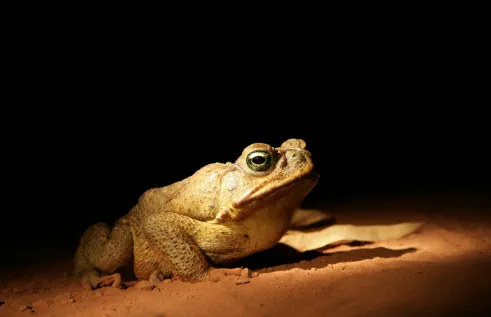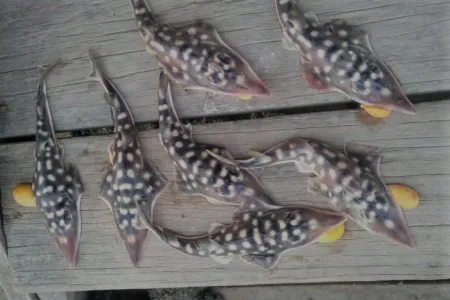News
Researchers help to learn more about critically endangered fish
A multi-national research team from Indonesia, Australia, and the United States, are hunting to find the home of one of the world’s most endangered fish, the Clown Wedgefish, a fish so elusive that it has only ever been recorded at fish markets.
Researchers from Charles Darwin University (CDU), the University of Southern Mississippi (USM), and Universitas Maritim Raja Ali Haji (UMRAH) are on the hunt in Indonesia’s Riau Islands in a bid to learn more about the Clown Wedgefish and its habitat to save the species.
Almost nothing is known about the Clown Wedgefish’s (Rhynchobatus cooki) natural habitat or distribution because it had only been spotted sporadically in fish markets in Singapore and Jakarta.
It comes after researchers recently found social media posts from fishers that suggested Clown Wedgefish habitat could be found in the southwest Riau Islands in Indonesia.
CDU’s Senior Research Fellow Dr Peter Kyne said this research is vital in developing a conservation plan for the endangered Clown Wedgefish.
“Clown Wedgefish are incredibly rare and are in decline having been impacted in a significant way by fishing,” he said.
“Our research is trying to understand the habitat of the Clown Wedgefish, for example if they live around coral reefs, mangroves, or on sand.”
“This information will then help us to develop conservation and management plans for the species.”
The team recently travelled to the island of Singkep in Indonesia, one of only four locations that the Clown Wedgefish is suspected to call home.
In the field, USM’s Associate Professor Dr Nicole Phillips and graduate student Emma Humphreys trained the team in targeted environmental DNA water sampling and applied this to search for the presence of Clown Wedgefish in the area.
The team circumnavigated the island, which lies to the east of Sumatra to provide a comprehensive sampling of the coastal zone and adjacent small islands.
“During our fieldwork we were able to collect 100 samples from 33 sites around the island,” Dr Phillips said.
“Fish shed DNA through their scales, mucus, and excrement and this gets released into the environment. The water samples will be screened to see if they contain DNA from the Clown Wedgefish.”
“This will help us to pinpoint the habitat of the Clown Wedgefish.”
For CDU student, Ms Benaya Simeon, this work is helping inform her PhD project which is looking more broadly at understanding the geographic range and habitat of the species and the threats it faces.
“The susceptibility of the species and the intensity of fisheries requires robust research to inform conservation plans and regulations for its management,” Ms Simeon said.
“Indonesia is dominated by small scale fishers which have high a dependency on marine resources. It is important to save the Clown Wedgefish as a species unique to these islands.”
As part of her PhD, Ms Simeon plans to undertake more field trips to meet with local fishers and traders and gain a greater understanding of how they interact with the species.
The project team also includes local community members keeping an eye out for Clown Wedgefish appearing in local fish markets.
The international collaboration, supported by the Save Our Seas Foundation, hopes to secure the future of the Clown Wedgefish.
Related Articles

First “hype cycle” of AI development put tech above humans
Users around the world have rushed to adopt artificial intelligence - especially in safety-critical fields - but a new study has revealed the hype has prioritised technology for technology’s sake instead of human-centred development.
Read more about First “hype cycle” of AI development put tech above humans
Nanoplastics hindering cognitive abilities of fish, international research shows
Nanoplastic exposure can impair the cognitive abilities of fish and could lead to significant impacts on marine species’ ability to survive, according to a new international study.
Read more about Nanoplastics hindering cognitive abilities of fish, international research shows
Eradication would cost billions: NT’s lessons for Pilbara’s cane toad management
Cane toads are predicted to invade Western Australia’s Pilbara region by 2041 if left unchecked, but the Northern Territory’s population of the pests hold key lessons that could save billions in eradication costs.
Read more about Eradication would cost billions: NT’s lessons for Pilbara’s cane toad management
